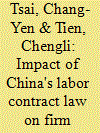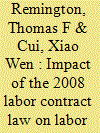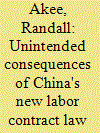|
|
|
Sort Order |
|
|
|
Items / Page
|
|
|
|
|
|
|
| Srl | Item |
| 1 |
ID:
106249


|
|
|
|
|
| Publication |
2011.
|
| Summary/Abstract |
This study extends research on issues relating to China's Labor Contract Law to clarify the relationship between the introduction of the legislation and Taiwanese investments in China, interacting with any industry effect. It also examines how Taiwanese firms' degree of dependence on China is associated with their performance. Models, based mainly on eclectic theory and institutional theory, are employed to test hypotheses using panel data from 1,015 Taiwanese investments in China over twentyfive quarters. The findings reveal that the adoption ofChina's Labor Contract Law and Taiwanese firms' dependence on China are not always associated with firm performance, and industry factors can, under some circumstances, moderate the impact of the Law on firm performance. The findings provide business practitioners with evidence as to whether a new law (in this case, the Labor Contract Lawof China) can have an impact on a firm and how much the industry effect matters.
|
|
|
|
|
|
|
|
|
|
|
|
|
|
|
|
| 2 |
ID:
140288


|
|
|
|
|
| Summary/Abstract |
China's Labor Contract Law came into force on January 1, 2008. One of several important legislative acts aimed at improving the processing of labor grievances through mediation, arbitration, and litigation, and averting collective labor protest, it provides that all employed persons must work under written individual employment contracts. We evaluate the legislation's impact nationally and by province for the years before and after the law's adoption. Observing that the law's effect varied substantially across provinces, we estimate the effects of the law, controlling for time, development level, export intensity, and migrant labor share, on the volume of disputes by province using a cross-sectional time series design. We also examine the law's impact on the incidence of collective disputes and the grounds for disputes. We find that the law significantly increased the volume of labor disputes, raising questions about the relative costliness of the government's strategy for managing employment relations.
|
|
|
|
|
|
|
|
|
|
|
|
|
|
|
|
| 3 |
ID:
163508


|
|
|
|
|
| Summary/Abstract |
China's new Labor Contract Law, which intended to strengthen the labor protection for workers, went into effect on January 1, 2008. The law stipulated that the maximum cumulative duration of successive fixed-term (temporary) labor contracts is 10 years, and employees working for the same employer for more than 10 consecutive years are able to secure an open-ended (permanent) labor contract under the new law, which is highly desirable to employees. However, in order to circumvent the new Labor Contract Law, some employers may have dismissed workers, after the passage of the new law, who had worked in the same firm for more than 10 years. Using data from the 2008 China General Social Survey, we find strong evidence that firms did in fact dismiss their formal-contract employees who have been employed for more than 10 years. Additionally, using a regression discontinuity design based on this exogenous change in unemployment status for this particular group of workers, we show that the dismissed workers suffered significant welfare loss in terms of happiness. Our results are robust to various specifications and placebo tests.
|
|
|
|
|
|
|
|
|
|
|
|
|
|
|
|
|
|
|
|
|